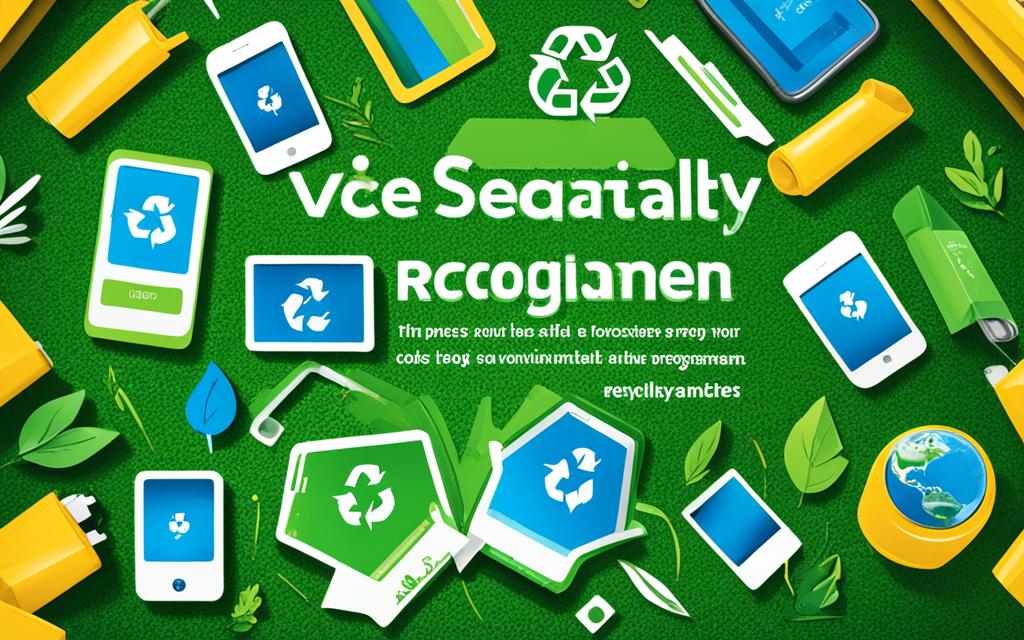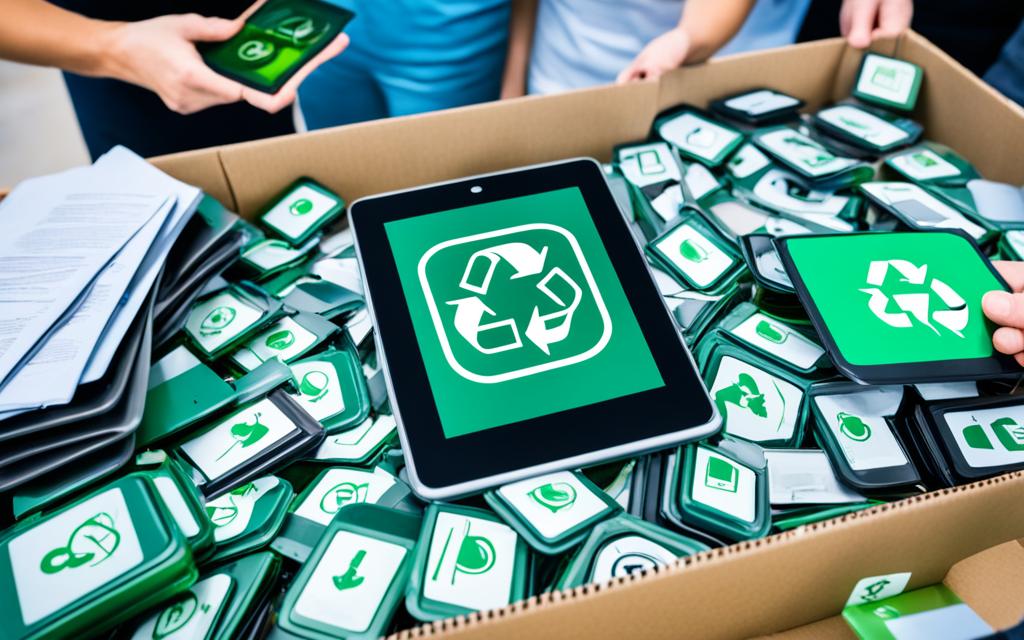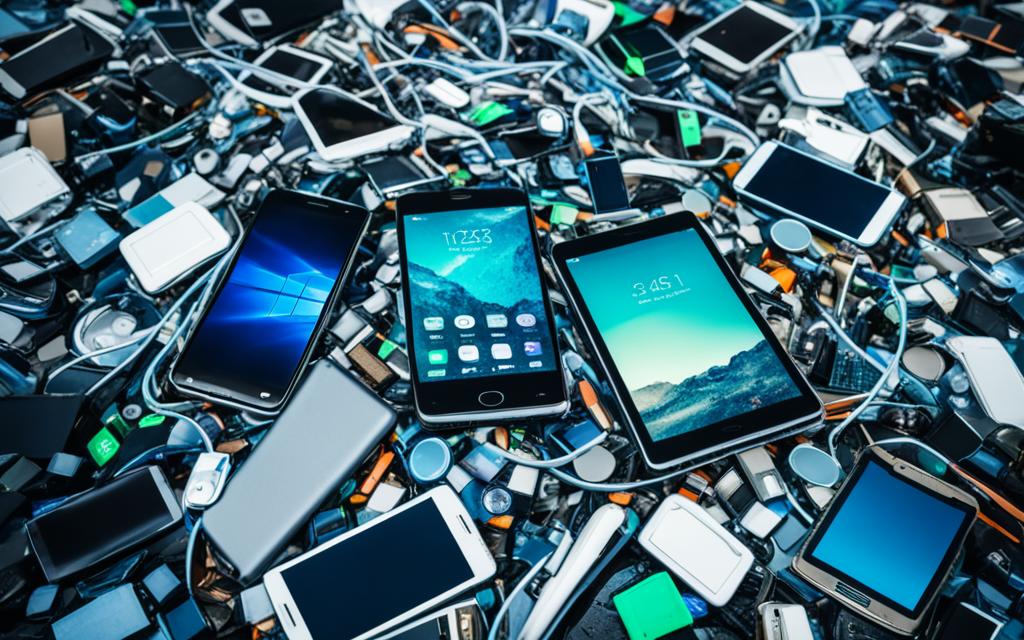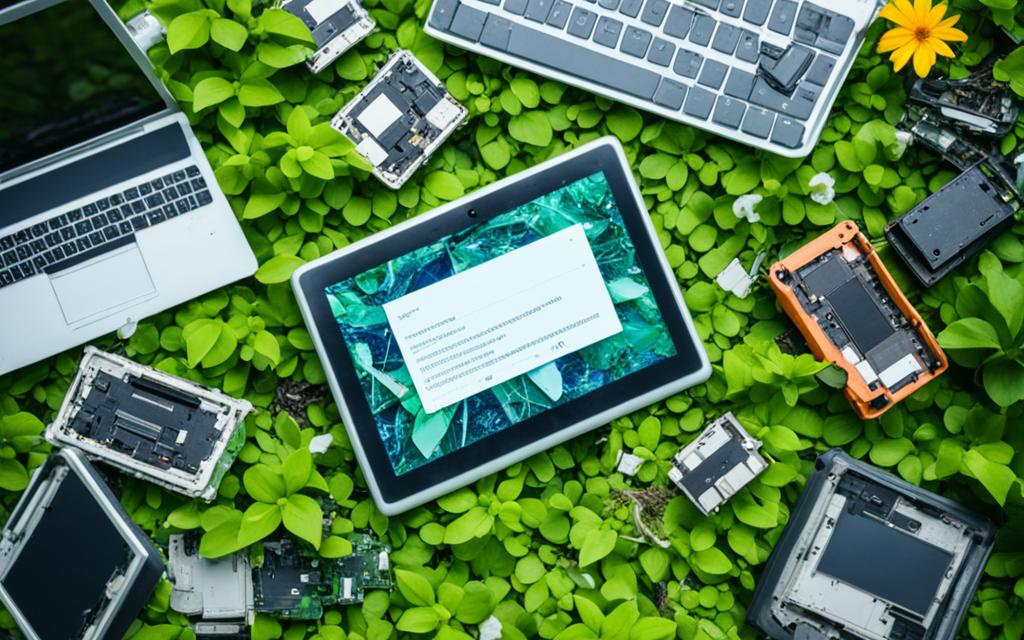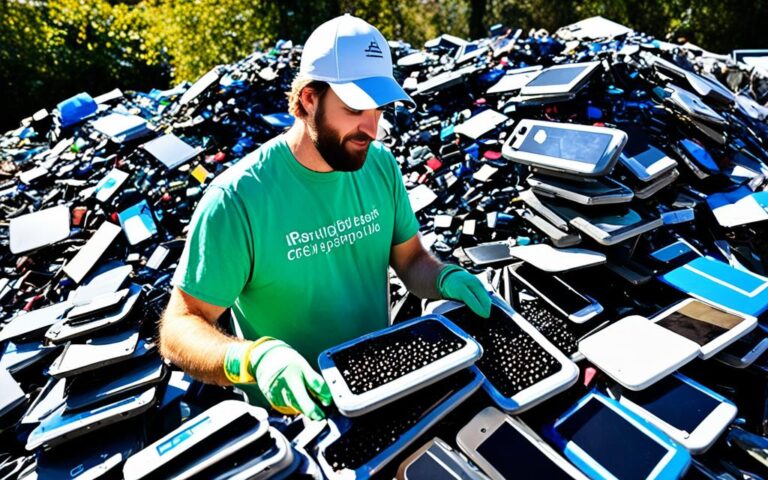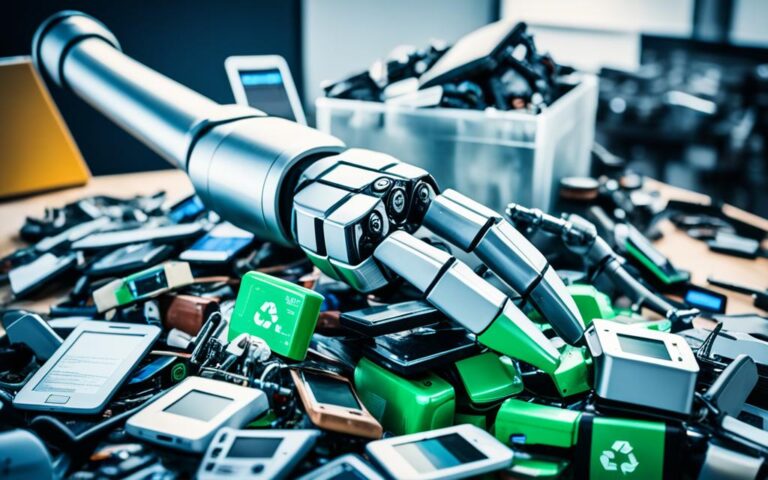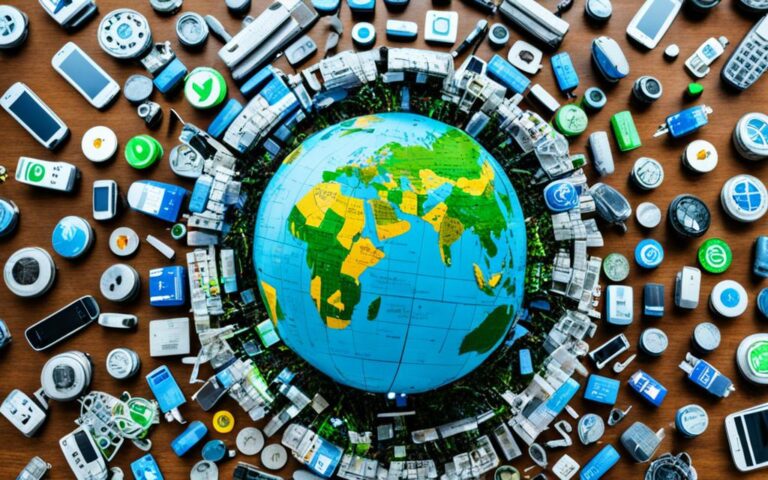The Role of Retailers in Phone and Tablet Recycling Programs
Did you know that when it comes to electronics recycling, not all retailers are created equal? According to a recent report by the U.S.-based Electronics Takeback Coalition, only a handful of major retailers have made a serious effort to encourage recycling, including Staples, Best Buy, and Office Depot.
These retailers have established robust recycling programs for a wide range of electronic devices, from smartphones to tablets. They make it easy for customers to bring back their old devices and ensure they are properly recycled. Unfortunately, not all retailers have followed suit.
Take a moment to think about the devices you’ve replaced over the years. What happened to them? Did they end up in a landfill, contributing to the growing electronic waste problem?
Electronic waste, or e-waste, contains hazardous materials that can be harmful to the environment if not disposed of properly. The improper disposal of electronics can lead to soil and water contamination, as well as air pollution. It’s clear that we need to take action to address this issue.
Retailers play a key role in phone and tablet recycling programs. By establishing effective recycling initiatives, they can encourage customers to responsibly dispose of their old devices and prevent them from ending up in landfills. Not only does this help protect the environment, but it also promotes a more sustainable future.
So, the next time you’re looking to upgrade your phone or tablet, consider supporting retailers with robust recycling programs. By doing so, you’ll not only be getting the latest technology but also be making a positive impact on the environment.
The Environmental Impact of Electronic Waste
The rampant consumer culture revolving around electronic devices has led to a staggering amount of electronic waste, or e-waste, being generated globally. The average American purchases a new phone every 18 months, resulting in the disposal of approximately 100-120 million phones each year. The consequences of this excessive electronic waste have far-reaching environmental impacts that demand our immediate attention.
E-waste contains a myriad of hazardous materials, including lead, mercury, arsenic, cadmium, and flame retardants. Improper disposal of e-waste can have devastating effects on the environment, contaminating soil and water sources. The toxic substances in e-waste can leach into the ground, polluting nearby ecosystems and posing a threat to both wildlife and human health. Additionally, when e-waste is incinerated or improperly recycled, it releases harmful pollutants into the air, exacerbating air pollution and contributing to climate change.
It is imperative that we recognize the significance of recycling cell phones and other electronic devices to mitigate the environmental impact of e-waste. Recycling not only helps conserve valuable resources and reduce the energy required for manufacturing new devices, but it also curbs the destructive mining process for minerals like gold, silver, and copper, which are widely used in electronics. By recovering and reusing these materials through recycling, we can minimize the need for further extraction, ultimately preserving natural habitats and ecosystems.
But it’s not just the environmental benefits that make e-waste recycling crucial; it’s also the protection of human health. When e-waste is improperly disposed of in landfills or incinerated, the toxic substances present in electronic devices can contaminate water sources, posing serious health risks for communities living nearby. These substances can lead to a range of health problems, including neurological disorders, respiratory issues, and even cancer.
By recycling electronic waste, we take a proactive stance in safeguarding our environment and the well-being of future generations. However, tackling the e-waste problem requires collective effort and awareness. Governments, organizations, and individuals all have a role to play in establishing effective recycling systems, promoting responsible consumer behavior, and advocating for stricter regulations to enforce proper e-waste management.
“The improper disposal of electronic waste not only harms our planet but also jeopardizes the health of communities worldwide. It is our responsibility to prioritize the recycling and responsible disposal of electronic devices to ensure a sustainable future for all.”
The Benefits of Recycling Electronic Waste
Recycling electronic waste offers several notable benefits:
- Environmental Preservation: By diverting e-waste from landfills and incinerators, recycling helps reduce pollution, conserve natural resources, and protect ecosystems.
- Energy Conservation: Recycling saves energy compared to extracting and refining raw materials. For example, recycling aluminum requires only 5% of the energy needed to produce it from scratch.
- Economic Opportunities: E-waste management and recycling present a growing market opportunity, driving job creation and fostering innovation in the recycling industry.
- Efficient Resource Allocation: Recycling valuable materials like gold, silver, and copper from e-waste cuts down on the need for further mining and reduces the environmental impact of resource extraction.
It is crucial that we take immediate action to address the environmental impact of electronic waste. Through responsible recycling practices, we can mitigate the damage caused by e-waste, protect our environment, and contribute to a more sustainable future.
The E-Waste Problem and Market Opportunities
The world generates approximately 50 million tons of e-waste every year, with small electronics and smart devices contributing a significant portion. Improper disposal of e-waste can lead to soil and water contamination, posing health risks to communities. However, this e-waste problem has opened up market opportunities for companies to address the issue.
Companies like Gizmogo offer solutions by buying old phones and other devices, regardless of their condition, and recycling them. This incentivizes consumers to recycle their devices and reduces the amount of e-waste generated.
The e-waste problem not only presents environmental challenges but also market opportunities. With the increasing awareness of the negative impact of e-waste, consumers are actively seeking ways to dispose of their old devices responsibly.
“The improper disposal of e-waste poses a significant threat to the environment and public health. Fortunately, companies like Gizmogo are stepping up and providing a solution. By offering to buy old phones and recycling them, they not only reduce the amount of e-waste in circulation but also create market opportunities for themselves. It’s a win-win situation that benefits both the environment and the economy,” says Sarah Johnson, an environmental advocate.
This shift in consumer behavior has created a demand for companies that specialize in e-waste recycling and disposal. These companies not only contribute to the preservation of the environment but also tap into a lucrative market.
Market Opportunities in E-Waste Recycling
E-waste recycling companies have the potential to capitalize on the growing market demand for responsible e-waste disposal. By establishing efficient collection, recycling, and repurposing processes, these companies can offer sustainable solutions to individuals, businesses, and even governments.
Moreover, the recycling and repurposing of e-waste helps to conserve valuable resources and reduce the need for extracting raw materials through mining. This benefits the environment by minimizing the ecological impact of resource extraction.
As the e-waste problem continues to escalate, governments and regulatory bodies are also taking note. They are implementing stricter regulations and policies to ensure proper e-waste management. This, in turn, creates an environment where e-waste recycling companies can thrive.
With the right approach and commitment to sustainability, e-waste recycling companies can tap into a burgeoning market and contribute to solving the e-waste problem.
| Benefits of E-Waste Recycling | Market Opportunities |
|---|---|
| Reduces soil and water contamination | Establishing efficient e-waste collection systems |
| Prevents health risks to communities | Building partnerships with retailers for e-waste collection |
| Conserves valuable resources | Exploring innovative ways to repurpose e-waste |
| Reduces the ecological impact of resource extraction | Adapting to evolving government regulations |
By seizing the market opportunities presented by the e-waste problem, companies can make a positive impact on the environment, society, and their bottom line.
Tech Companies and Sustainability
As the e-waste problem continues to grow, major tech companies are stepping up to address this environmental challenge. Apple and Microsoft, two leading players in the industry, have implemented initiatives to encourage responsible disposal of electronic devices and promote sustainability.
Apple’s Trade-In and Recycling Programs
Apple has established trade-in and recycling programs in multiple countries, allowing customers to trade in their old devices for credit towards new purchases. This encourages customers to upgrade their devices while ensuring that their old devices are recycled properly. By participating in these programs, Apple customers are not only able to benefit from discounts on new products but also contribute to the sustainability efforts of the company.
Microsoft’s Partnership with Recycling Organizations
Microsoft has recognized the importance of managing electronic waste and has partnered with recycling organizations to facilitate end-of-life management for electronic devices. Through these collaborations, Microsoft ensures that devices are recycled in a responsible and environmentally friendly manner, reducing the negative impact of e-waste. By taking an active role in recycling, Microsoft demonstrates its commitment to sustainability and encourages others in the industry to follow suit.
These efforts by tech companies like Apple and Microsoft play a significant role in addressing the e-waste problem and promoting sustainability within the industry. By establishing trade-in and recycling programs and partnering with recycling organizations, these companies are setting an example for others to follow.
“We believe that technological innovation and environmental sustainability can go hand in hand. That’s why we are committed to reducing our impact on the environment and helping our customers do the same.” – Apple
Through their initiatives, tech companies not only contribute to a more sustainable future but also inspire individuals and other businesses to prioritize responsible electronic waste management. By working together, we can create a circular economy where electronic devices are reused, recycled, and their valuable resources are preserved.
By embracing sustainability, tech companies not only demonstrate their commitment to the environment but also have the potential to drive significant change. The influence of these companies extends beyond their immediate customer base, inspiring a culture of responsible consumption and recycling.
Three Steps to Mitigate the E-Waste Problem
Individuals have the power to make a real impact in mitigating the e-waste problem by following three simple yet effective steps: reduce, repair, and recycle. By embracing these priorities, we can collectively contribute to the reduction of e-waste and protect the environment for future generations.
-
Reduce
One of the fundamental ways to mitigate the e-waste problem is by limiting unnecessary technology purchases. Often driven by the desire for the latest gadget, we frequently discard perfectly functional devices, adding to the ever-growing pile of e-waste. By purchasing with intention and considering the longevity of the product, we can significantly reduce e-waste. It’s time to break free from the cycle of constant upgrades and embrace the value of longevity.
-
Repair
Instead of immediately discarding a device when it malfunctions or becomes outdated, we should explore repair options. Repairing electronics not only extends their lifespan but also reduces the overall demand for new devices, curbing the production of additional e-waste. By supporting local repair shops or learning basic troubleshooting skills ourselves, we can breathe new life into our electronics and save them from becoming part of the e-waste problem.
-
Recycle
Proper disposal and recycling of electronic devices are crucial in mitigating the e-waste problem. When devices reach the end of their lifespan or are beyond repair, recycling ensures that valuable materials are reclaimed and hazardous components are disposed of safely. To promote responsible disposal, consider adding electronics recycling containers to office spaces, educational institutions, and public areas. By making recycling convenient and accessible, we can encourage more people to participate in responsible e-waste management.
Entrepreneurial individuals can also contribute to e-waste mitigation by buying used devices, repairing and reselling electronics, or even starting their own electronics recycling initiatives. By embracing sustainable practices and raising awareness about the importance of responsible e-waste management, we can collectively create a greener future for our planet.
The Future of Retailer Recycling Programs
As the awareness of the environmental impact of e-waste continues to grow, it is expected that more retailers will prioritize recycling programs. Consumers are becoming more conscious of sustainability and eco-friendly practices, which will drive demand for retailer recycling programs. With the emergence of market opportunities and the efforts of tech companies, the future of retailer recycling programs looks promising in fostering sustainability and inspiring eco-friendly practices.
The Demand for Eco-Friendly Practices
Consumers are increasingly concerned about the environmental impact of their purchases. They want to support retailers that prioritize sustainability and take responsibility for their products’ end-of-life. This growing demand for eco-friendly practices creates a significant opportunity for retailers to implement and expand their recycling programs.
Inspiring Change Through Market Opportunities
The e-waste problem has opened up market opportunities for companies that offer recycling and disposal solutions. Retailers can tap into this growing market by partnering with recycling organizations or developing their own recycling infrastructure. By incorporating sustainable practices into their business models, retailers can inspire change and lead the way in reducing environmental harm.
“The future of retailer recycling programs looks promising in fostering sustainability and inspiring eco-friendly practices.”
Collaboration with Tech Companies
Major tech companies have already recognized the importance of addressing the e-waste problem. By collaborating with these companies, retailers can leverage their expertise and resources to improve their recycling programs. Retailers can partner with tech companies to develop innovative solutions, such as trade-in programs and responsible end-of-life management for electronic devices.
Education and Awareness
Retailers play a crucial role in raising awareness and educating consumers about the importance of recycling electronic devices. By providing information and resources, retailers can empower individuals to make informed choices and actively participate in responsible e-waste disposal. Increased education and awareness will further drive the demand for retailer recycling programs.
The Future is Sustainable
With consumers increasingly prioritizing sustainability, the future of retailer recycling programs looks bright. By embracing recycling and implementing eco-friendly practices, retailers can align themselves with customer values, foster sustainability, and contribute to a greener future. The collaboration between retailers, tech companies, and consumers is essential in tackling the e-waste problem and creating a more sustainable world.
Conclusion
Retailers play a crucial role in phone and tablet recycling programs, but the assessment by the Electronics Takeback Coalition reveals that only a few retailers have made significant efforts in encouraging electronics recycling. The environmental impact of e-waste necessitates responsible disposal and recycling practices to mitigate the problem.
Both companies and individuals have the power to contribute towards addressing the e-waste issue. Implementing recycling programs, promoting sustainability, and raising awareness are essential steps towards creating a more sustainable and greener future. The growing demand for eco-friendly practices further emphasizes the importance of retailer recycling programs.
As the awareness of the environmental impact of e-waste continues to increase, it is expected that more retailers will prioritize recycling initiatives. The efforts made by tech companies like Apple and Microsoft set an inspiring example, encouraging responsible disposal of electronic devices and contributing to sustainability efforts.
By working together, retailers, tech companies, and individuals can make a significant impact in reducing e-waste and conserving the environment for future generations. Let us embrace the challenge, take action, and create a better, more sustainable world.
FAQ
Do all retailers have recycling programs for electronics?
No, according to a report by the U.S.-based Electronics Takeback Coalition, only three major retailers – Staples, Best Buy, and Office Depot – have made serious efforts to encourage electronics recycling. Other retailers, including Walmart and Amazon, do not have real recycling programs in place.
Why is it important to recycle electronic devices?
Electronic waste, or e-waste, contains hazardous materials that can contaminate soil, water, and air if improperly disposed of. Recycling cell phones and other electronic devices helps conserve the environment, save energy, reduce the mining process for valuable minerals, and prevent health problems caused by toxic materials.
How much e-waste is generated globally?
The world generates approximately 50 million tons of e-waste every year, with small electronics and smart devices contributing a significant portion.
What steps are tech companies taking to address the e-waste problem?
Major tech companies like Apple and Microsoft have implemented trade-in and recycling programs. They encourage responsible disposal of electronic devices and contribute to sustainability efforts.
How can individuals contribute to reducing e-waste?
Individuals can make a difference by following three priorities: reduce unnecessary technology purchases, repair devices instead of discarding them, and recycle devices at the end of their lifespan. They can also buy used devices, repair and resell electronics, or add electronics recycling containers to office spaces to promote responsible disposal.
Will more retailers prioritize recycling programs in the future?
As awareness of the environmental impact of e-waste grows, it is expected that more retailers will prioritize recycling programs. The demand for eco-friendly practices and sustainability will drive this change.
What role do retailers play in phone and tablet recycling programs?
Retailers play a crucial role in phone and tablet recycling programs, but according to the Electronics Takeback Coalition, only a few retailers have made significant efforts in encouraging electronics recycling.

